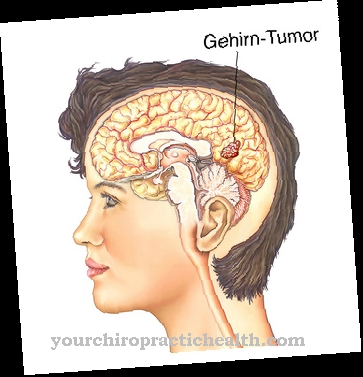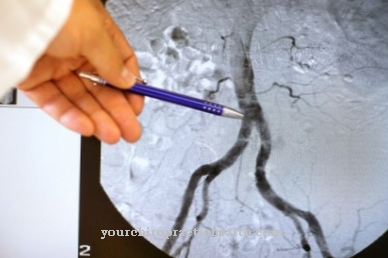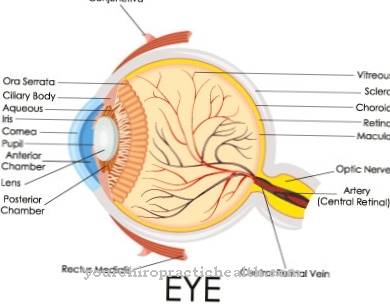After the birth of a child, women, but also men, can suffer from psychological disorders and even psychosis. The best known postpartum mood crisis is postpartum depression. Treatment takes place on an outpatient or inpatient basis using self-help and professional help from a psychologist or psychiatrist.
What are postpartum mood crises?

© alisseja - stock.adobe.com
The puerperium is the time between delivery and regression of the body changes caused by pregnancy. The puerperium typically lasts between six and eight weeks. The mother recovers from the pregnancy during this time.
Sychical or behavioral disorders can occur during the postpartum period. The ICD-10 differentiates between mild mental disorders and severe disorders in the puerperium. The concept of postpartum mood crisis summarizes mental states and disorders that occur temporally in connection with the puerperium phase.
The mood crises can range from mild sadness to severe depression and even psychotic states. In addition to the mother herself, the father of the newborn can also be affected by postpartum mood crises. A rough distinction is made between postpartum mood depression, postpartum depression (PPD) and postpartum psychosis (PPP).
The causes of postpartum mood crises usually consist of several factors, the weighting of which depends on the individual case.
causes
For the mother, childbirth is a physically immense effort that can lead to a state of exhaustion. The mother's abdomen, breasts, metabolism, and digestion all change significantly after birth. In addition, the progesterone level suddenly drops and can provoke depression-like states.
The drop in the level of estrogen causes sleep disorders at the same time. Often there is also a thyroid hormone deficiency, which can trigger anxiety or panic attacks. From a biological point of view, the mother suffers from weakness, exhaustion and possibly depression after giving birth.
In addition to the physical factors, there are also psychological factors. The birth often confronts the mother with fear of failure or pain and calls on the woman to say goodbye to her own childhood. New social structures arise and can become psychological stress, for example changing roles from career woman to mother and housewife.
That being said, many mothers feel they are under pressure from the mother image from advertising, films, literature or their own environment. So there are enough causes for the postpartum mood crisis. From an evolutionary perspective, the mother is also signaled an impending loss of fitness after the birth.
Symptoms, ailments & signs
The symptoms of a postpartum mood crisis depend on the type of condition. The low mood or baby blues is the mildest form and subsides within hours or days. Mood lability, slight sadness, crying, irritability, worries about the child and exhaustion characterize the clinical picture.
In addition, there are irritability, anxiety, appetite disorders as well as sleeplessness, restlessness and concentration disorders. For the baby blues, the hormonal change plays a major role. Postpartum or puerperium depression is characterized by gradual development and is accompanied by physical symptoms.
In addition to a lack of energy, an inner feeling of emptiness, feelings of guilt and an ambivalent attitude towards one's own child, disinterest, absence and hopelessness can speak in favor of a PPD. Thoughts of killing, headaches, arrhythmias, numbness and tremors are common symptoms. The same applies to dizziness and difficulty concentrating and sleeping.
The puerperium psychosis is a serious complication in the puerperium and is associated with paranoid-hallucinatory symptoms, which can be characterized by states of anxiety, states of excitement and confusion. Mania and schizophrenia during the puerperium are considered mixed forms.
Diagnosis & course of disease
In many cases, a postpartum mood or mood crisis is only recognized when physical symptoms appear. Many of those affected are ashamed of their psychological state and above all try to hide thoughts of killing from those around them. Because of the feelings of shame, most women with a mood crisis do not turn outside on their own.
In individual cases, family members recognize the psychological upset and turn to a psychologist or psychiatrist. The prognosis depends on the subtype of the disease. The baby blues is characterized by an extremely favorable prognosis. Postpartum depression should be treated immediately as there is a risk of suicide in this case.
Postportal psychosis requires immediate admission to a psychiatric institution and is associated with the worst prognosis. Sometimes this disease does not completely heal even after years.
Complications
The birth of a child, especially the first, represents an exceptional situation in life for practically all women. Regardless of how desired the child was: The complete restructuring of everyday life and the alignment entirely to the needs of the child are a challenge for every mother. In this respect, postpartum mood crises are generally not particularly unusual or worrying.
Nevertheless, the course of such a mood crisis must be closely monitored. Even an initial mood crisis can turn into full-blown depression. Especially when a mother feels overwhelmed in her individual life situation and does not get the necessary help, a mood crisis develops quickly. If left untreated, this can lead to major complications. Once a woman has become depressed after giving birth, it is usually difficult to leave the disease behind without specialist medical help.
Severe depression as a complication affects everyday life. Many mothers affected by depression are barely able to cope with their everyday lives and taking care of the child on their own. Sometimes an inpatient exception is required. The first signs of a postpartum mood crisis should therefore be taken seriously and carefully monitored as they progress.
When should you go to the doctor?
After the birth of a child, both women and men can experience emotional or mental fluctuations. The whole course of life changes with the new arrival. This circumstance represents a new situation that causes stress in many people. Medical assistance is not always required in this phase. In a first step, those affected should endeavor to exchange ideas with people who have also had children and are familiar with the situation. Helpful tips can be exchanged, which in many cases lead to an improvement.There are numerous contact points on the Internet that point out the changes in advance and thus prepare the parents-to-be for the new situation.
However, if the symptoms persist or if they intensify, a doctor should be consulted. A strong tearfulness, persistently depressed mood or excessive demands should be discussed with a doctor or psychologist. If the everyday requirements cannot be met or if sufficient care for the offspring cannot be guaranteed, professional support is required. A doctor should be consulted in the event of severe dissatisfaction, insomnia, exhaustion or internal weakness. There is a need for action in the case of aggressive behavioral tendencies, disinterest or lack of care for yourself and the newborn.
Treatment & Therapy
Self-help plays an important role in the treatment of postpartum depression. Help from your partner, family and friends is just as important. The person concerned can also benefit from professional help with household chores and the care of the baby.
In addition to self-help, the post-portal mood usually requires professional support. Severe postpartum depression or psychosis will be handed over to professionals as quickly as possible. In this case, hospital stays may be necessary in order to save the life of both mother and child.
For professional treatment, measures such as psychotherapy, music therapy and systemic family therapy are available. Most of these measures are combined with conservative drug steps such as psychopharmacotherapy, naturopathic therapy or hormone therapy.
There are special outpatient clinics for those affected, such as the mother-child outpatient clinic for postpartum mentally ill mothers. In case of doubt, these special outpatient clinics arrange inpatient treatment and are not only open to the mother but also to observing family members to seek help.
You can find your medication here
➔ Medicines against depressive moods & to lighten the moodprevention
Experience has shown that some relationships are to be regarded as risk factors for postpartum mood crises. Social isolation is one of these risk factors. In addition, a lack of support from partner or family and friends can increase the risk of a mood crisis after the birth.
The same applies to perfectionism and an exaggerated mother image of pregnant women. In order to prevent mood crises, the mentioned relationships should be counteracted before the child is born. A psychologically stable general situation is to be aimed for.
Aftercare
A postpartum mood crisis should not be taken lightly, even after the actual treatment. Especially if depression has already existed after previous births. In addition to providing support during the actual birth, people you trust, such as midwives, should also be available after the birth and provide assistance with their specialist knowledge if problems arise.
Both doctors and midwives should be people they can trust and provide emotional support in the course of discussions or house calls. Even after the mood crisis, complementary medicinal drugs can provide support without having to suffer from side effects. Regular Reiki coaching is a good way to stay free of symptoms such as tiredness, irritability and sadness in the long term.
As an alternative healing method, Reiki can help to deal with the causes of bad moods so that those affected feel happiness and satisfaction in the long term. Reiki coaching provides holistic support and has a positive effect on body, mind and soul. Reiki can be used while sitting, lying down or standing and can also be done in couple sessions.
This alternative method supports the mother's self-confidence, relieves fears and emotional blocks and improves communication with the child. In the course of couple sessions, the parents can do something for themselves together, which is sure to have positive effects on the child.
You can do that yourself
In order to cope with postpartum mood crises, it is initially helpful to talk to the doctor or midwife to find out about their cause and development: Knowledge of the hormonal, but also psychological background, can bring relief to the young mother. The partner, trusted family members or a good friend can also serve as the first point of contact during a low mood - if the exchange with them is not enough, professional help or contact with a self-help group should be considered.
Those affected should ensure a healthy diet: If you have a loss of appetite, it is important to eat small meals regularly. Fresh fruits and vegetables provide the body with the necessary vitamins and trace elements, while carbohydrates serve as energy suppliers. Adequate hydration should also be important. In everyday life it may be necessary to limit yourself to the most necessary tasks for a while and to postpone everything that is less important. Those affected should do this without a guilty conscience and not be afraid to accept help with household chores and childcare.
Sufficient sleep and regular recovery phases also help to get out of the postpartum mood crisis more quickly. Exercise also has a positive effect on physical and mental well-being: Even a daily walk in the fresh air can contribute to recovery.

.jpg)
.jpg)





















.jpg)



